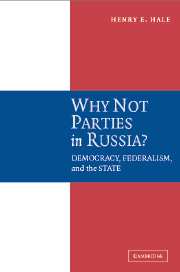Book contents
- Frontmatter
- Contents
- Acknowledgments
- 1 Electoral Markets and Russia's Political Smorgasbord
- 2 Party Entrepreneurship in Russia's Electoral Market 1989–2005
- 3 How Much Party Is in the Party System?
- 4 Electoral Markets and Party Substitutes in Russia : Origins and Impact
- 5 Parties and Party Substitutes : Determining the Balance
- 6 Conclusion : The Market Model and Theories of Parties, National Integration, and Transitions from Authoritarian Rule
- References
- Index
2 - Party Entrepreneurship in Russia's Electoral Market 1989–2005
Published online by Cambridge University Press: 06 July 2010
- Frontmatter
- Contents
- Acknowledgments
- 1 Electoral Markets and Russia's Political Smorgasbord
- 2 Party Entrepreneurship in Russia's Electoral Market 1989–2005
- 3 How Much Party Is in the Party System?
- 4 Electoral Markets and Party Substitutes in Russia : Origins and Impact
- 5 Parties and Party Substitutes : Determining the Balance
- 6 Conclusion : The Market Model and Theories of Parties, National Integration, and Transitions from Authoritarian Rule
- References
- Index
Summary
Entrepreneurship begins with a dream but gets nowhere without capital. Political entrepreneurship is no different. In the land of electoral opportunity that was transitional Russia, there was no shortage of dreams. Political capital, the set of tangible and intangible resources with the potential to translate into electoral success, was another story. The USSR's history of “patrimonial communism” and the particular path that Russia's leaders chose for its transition to markets and electoral democracy had left in place a society in which political capital was highly concentrated in a few pockets, most of which required access to the state to obtain. With few exceptions, then, only a small set of individuals with strong connections to Russian power structures had a realistic chance to launch Russia's initial political parties. But if dreams and political capital were necessary to get a party off the ground, still more depended on how the political entrepreneur chose to use this capital; like financial capital, it could be squandered without the skill and forethought to develop a solid strategy for long-term growth. Party leaders were still not completely in control of their own fates, even given healthy supplies of political capital and favorable institutions; events that are best considered random exogenous shocks periodically rocked the Russian political market in ways nearly impossible for any theory to predict. Russia's presidential administrations also intervened at times to tip the political scales away from certain party-building projects.
- Type
- Chapter
- Information
- Why Not Parties in Russia?Democracy, Federalism, and the State, pp. 26 - 90Publisher: Cambridge University PressPrint publication year: 2005



